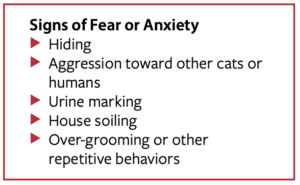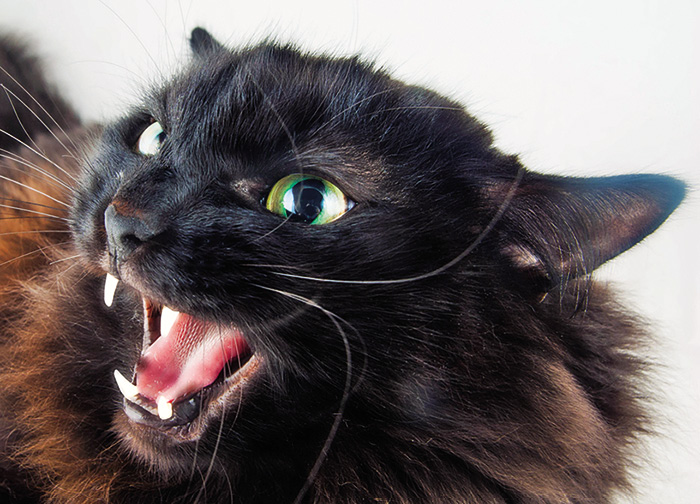The focus on feline mental health is increasing in veterinary medicine as more cat owners learn that medications can play a role in treating anxiety and other behavioral disorders.
“Anti-anxiety medication may be warranted for a cat who has a moderate to severe anxiety-based behavior problem or experiences frequent anxiety,” says Pamela J. Perry, DVM, PhD, behavior resident at Cornell University’s College of Veterinary Medicine.
Qualifying Behavior
All cats will experience a little fear or anxiety in their lives due to day-to-day stressors, which is fine. The problem occurs when a cat’s stress-related behavior starts to interfere with his ability to lead a normal life or causes harm to others in the household.
For example, many cats hide when a stranger comes into the house. Depending on your cat’s personality, he may take hours to days to investigate the stranger. This is normal. But if your cat is so scared that he is unable to access food, water, and/or his litterbox when a stranger is in the house, this can become a problem. Cats with more severe anxiety may even panic and hide when they hear people outside. These situations are not ideal for the cat.
Aggression due to fear, which is often shown as lashing out when the cat feels he is cornered, can result in injuries to humans and other pets in the household. And no one enjoys cleaning up after an anxious cat who pees throughout the house. These issues generally drive owners to seek help quickly.
 The Right Medication
The Right Medication
Your veterinarian or a veterinary behaviorist can help you determine if your cat would benefit from anti-anxiety medication and will steer you toward the right medication to try first.
“SSRIs—such as fluoxetine or sertraline—and clomipramine are commonly prescribed for cats with anxiety disorders,” says Dr. Perry. You may know fluoxetine by the brand name Prozac and sertraline as Zoloft.
“With inter-cat aggression, buspirone is often prescribed for the ‘victim’ cat because it tends to make kitties bolder and friendlier so they are less likely to run away from the aggressor,” says Dr. Perry.
While it may seem counterintuitive, encouraging the victim cat to stand his ground calmly can take the wind out of a bully cat’s sails.
All these medications are usually used long-term, either for several months while you also work on a behavioral modification plan before weaning off or as a permanent part of your cat’s care.
Different medications can be helpful for cats who only experience severe anxiety in specific situations. “Benzodiazepines, gabapentin, and trazodone also have been used in felines, usually as situational medications,” says Dr. Perry.
These drugs can be given an hour or so before the stressful event, such as a car ride to the veterinarian or company arriving at the house.
Results
How quickly you will see improvements from anti-anxiety medications depends on the drug your cat is taking and why he is taking it.
“For SSRIs and clomipramine, it may take up to four to six weeks to see clinical benefits,” says Dr. Perry. These drugs are long-term medications for anxiety and take time to build up in your cat’s system. Your cat will likely stay on these medications for several months or for the rest of his life.
“For gabapentin, trazodone, or benzodiazepines, the effects usually are seen within one to two hours,” says Dr. Perry. These are situational medications that are useful for specific times when your cat is likely to be stressed out, such as during travel or a family gathering.




